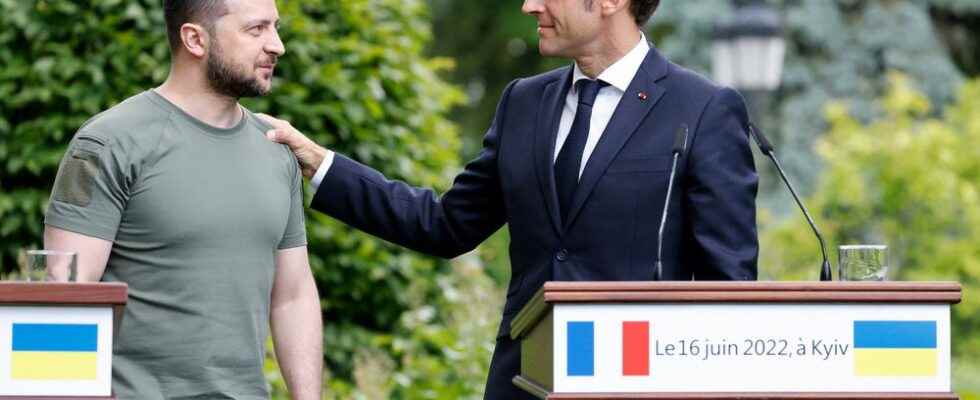There were still two countries reluctant to convince, Portugal and Denmark. At the end of what he presented as a “telephone negotiation marathon“, Volodymyr Zelensky thanked their leaders on Tuesday for their promise to grant the status of candidate to the European Union to Ukraine during the European Council, Thursday, June 23. In the wake of the ukrainian president tweetsthe French Minister for European Affairs, Clément Beaune, confirmed that there was now a “total consensus” of the Twenty-Seven to endorse the candidacy.
Barring a last-minute reversal in Brussels, this European Council will therefore be a milestone in the history of Ukraine. In the midst of a war of resistance against the Russian offensive, the country is preparing to take a crucial step towards its dream of joining the European Union (EU).
For Vladimir Putin, opposed to any emancipation of his neighbour, this is a political defeat. For the Ukrainians, it is an emblematic victory, while the fighting, particularly in the Donbass, causes dozens of deaths in the ranks of their soldiers every day. “Have official status [de candidat] will give them strong morale, Ukrainian Deputy Prime Minister Iryna Vereshchuk told L’Express a few days earlier. They need this symbolic gesture.”
The opinion is shared in Brussels. “Ukrainians are fighting for our common values, people have been dying for them since 2014 and the Maidan revolution, underlines a senior official. The most important thing is to give them a European perspective which they did not have, as Moldova.” This small country of 2.6 million inhabitants, located between Romania and Ukraine, should also obtain EU candidate status on Thursday.
Ukrainian President Volodymyr Zelensky and his French counterpart, Emmanuel Macron, on June 16, 2022, in kyiv.
Ludovic MARIN / POOL / AFP
So far, Ukraine has had to make do with an association agreement, in force since 2017. It has allowed it to obtain political and economic support from the Union and preferential access to its internal market. He also urged it to converge its legislative framework with that of the EU, through economic, judicial and financial reforms.
But if efforts have been made, kyiv remains far from the mark. This is clear from the message sent to the Council and the European Parliament by the Commission when delivering its positive opinion on the application. She recalls that “corruption remains a serious challenge” for the country. And that “the implementation” of the “legal and institutional framework ensuring respect for fundamental rights (…) must be further improved”.
“Before the war, Ukraine was one of the most corrupt countries in Europe,” recalls a European diplomat. In its 2021 report on corruption, the NGO Transparency International ranks Ukraine 122nd out of 180. This is better than in 2014 (142nd), but still very far behind its EU neighbors, since the least well placed , Bulgaria, is in 78th place.
An economy to adapt
There is another concern for going beyond the simple status of candidate and being in a position to start genuine accession negotiations with the EU: that of economic convergence. “With 43 million inhabitants – before the war – Ukraine would become the 5th largest country in the EU, while its GDP per capita is a third of that of Bulgaria, the poorest Member State, stresses a European source. Cereal power turned towards export, it would benefit from considerable subsidies by the common agricultural policy (CAP). Who would be ready to sign a check to increase the European budget? The question particularly worries Paris, the first beneficiary of the CAP.
A Ukrainian soldier comes out of a shelter in a trench, in the Donbass region, on June 6, 2022.
afp.com/ARIS MESSINIS
But such a deadline seems all the more distant as the fighting could last for years and the questions of sovereignty could take even longer to be resolved. “The European Union cannot bring in a country at war or which has border problems”, recalls the geographer Michel Foucher. In addition to the occupation of Donbass and a large part of southern Ukrainian territory, there is the annexation of Crimea by Moscow in 2014. The obstacle also concerns Moldova, where there is a separatist territory, Transnistria , hosting a Russian military base.
In the meantime, the status of candidate country has the value of encouraging the Ukrainians to turn their backs on the post-Soviet model, where oligarchs very often reign, whose influence the Commission denounces. “The young generation around Zelensky are modern Europeans who really want to change things, argues a European source. It is possible that Ukraine will make a leap of modernization in favor of reconstruction and that the march towards Membership is going faster than we imagine.”
Poland had taken a decade to go from candidate to member state in 2004. However, the current trend does not lend itself to such rapid membership. The enlargement process has been blocked for years, as can be seen from the four candidate countries of the Balkans (North Macedonia in 2005, Montenegro in 2010, Serbia in 2012 and Albania in 2014). As motivated as it is, Ukraine will have to arm itself with patience.
Clément Daniez (with Isabelle Ory, in Brussels)
